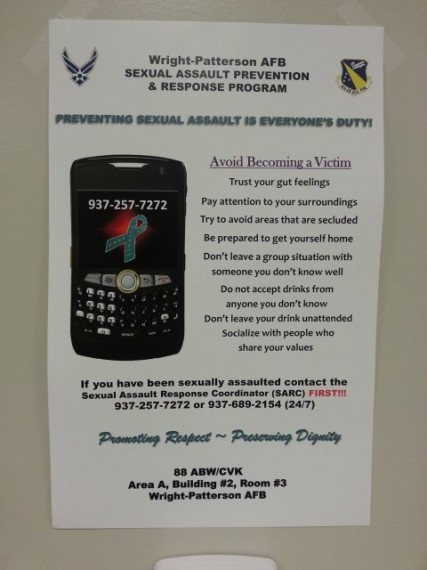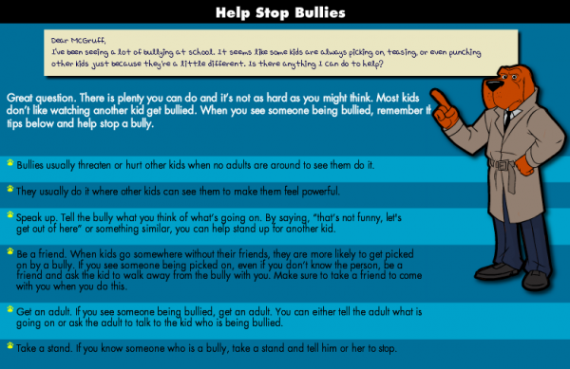Teaching Prevention is Not ‘Blaming the Victim’
The Air Force is telling airmen to take common sense steps to "avoid becoming a victim" of sexual assault.
The Air Force is telling airmen to take common sense steps to “avoid becoming a victim” of sexual assault.
Think Progress (“Female Service Member Slams Air Force’s Victim-Blaming Sexual Assault Poster”):
“Pay attention to your surroundings.” “Be prepared to get yourself home.” “Socialize with people who share your values.” These are just some of the suggestions for women listed on an anti-sexual assault advisory poster in the female bathroom of Wright-Patterson Air Force Base in Ohio, under the header “Preventing Sexual Assault Is Everyone’s Duty”:
Jennifer Stephens, an armed forces veteran and battalion commander in the Ohio National Guard who works on the base, took issue with what she felt was a harmful message conveyed in the poster. “I think this is part of the reason victims are afraid to report incidents,” she said in an interview with Business Insider. “If you’re a victim and you’ve done one of the things on that list, you now feel like it’s your fault that you were sexually assaulted.”
Stephens decided to make her objections known. After pasting a lettercriticizing the victim-blaming messaging on top of the poster, she emailed suggestions to the base’s sexual assault response office. Stephens wrote that a more productive approach would be one that “support[s] victims as opposed to tearing victims down by plastering these types of posters all over the base,” and asked, “[H]ow you would feel if you had been assaulted… and one of the first questions they asked you was what you were wearing or if you were alone or if you were drunk?”
But these are separate issues. Stephens is absolutely right to object to badgering victims of sex crimes. But the poster is simply telling people that there are steps that they can take to make it harder to criminals to target them; we do that every day for all manner of crimes.
Is McGruff the Crime Dog blaming the victim when he tells kids to travel with friends and “take a stand” against bullies?
Or advising girls who think they’re being harassed online to “Stop talking to the person you were talking to,” “Talk to an adult right away,” and “Go to a different chat room”?
Is the LAPD blaming the victim when it offers prevention tips for identity theft, stopping violence, carjacking, and ATM safety and security? Indeed, their Street Smarts page is essentially a long form version of what the Air Force advises in terms of sexual assault prevention:
Test Your “Street Smarts” IQ: Do you…
- Jog or walk by yourself early in the morning or late at night when the streets are quiet and deserted?
- Stuff your purse with cash, keys, credit cards, checkbook – and then leave it wide open on a counter, your desk, the floor?
- Put your wallet in a jacket, which you then hang up or throw over a chair?
- Let your mind wander – thinking about your job, or all the things you have to do – when walking or driving?
- Think it’s a waste of time to lock your car when you’ll be back in a few minutes?
If you answered “yes” to any of these questions, you need to change a few habits. Even if you answered “no” and made a perfect score, read on. Spend a few minutes now to prevent trouble later.
Basic Street Sense
- Wherever you are – on the street, in an office building or shopping mall, driving, waiting for a bus or subway – stay alert and tuned in to your surroundings.
- Send the message that you’re calm, confident, and know where you’re going.
- Trust your instincts. If something or someone makes you uneasy, avoid the person or leave.
- Know the neighborhoods where you live and work. Check out the locations of police and fire stations, public telephones, hospitals, and restaurants, or stores that are open late.
On Foot
- Stick to well-traveled streets. Avoid shortcuts through wooded areas, parking lots, or alleys.
- Don’t flash large amounts of cash or other tempting targets like expensive jewelry or clothing.
- Carry a purse close to your body, not dangling by the straps.
- Put a wallet in an inside coat or front pants pocket, not a back pocket.
- Try to use automated teller machines in the daytime. Have your card in hand and don’t approach the machine if you’re uneasy about people nearby.
- Don’t wear shoes or clothing that restrict your movements.
- Have your car or house key in hand before you reach the door.
- If you think someone is following you, switch direction or cross the street. Walk toward an open store, restaurant, or lighted house. If you’re scared, yell for help.
- Have to work late? Make sure there are others in the building, and ask someone – a colleague or security guard – to walk you to your car or transit stop.
Learn more about auto theft and carjacking.
- Keep your car in good running condition. Make sure there’s enough gas to get where you’re going and back.
- Always roll up the windows and lock car doors, even if you’re coming right back. Check inside and out before getting in.
- Avoid parking in isolated areas. Be especially alert in lots and underground parking garages.
- If you think someone is following you, don’t head home. Drive to the nearest police or fire station, gas station, or other open business to get help.
- Don’t pick up hitchhikers. Don’t hitchhike.
On Buses and Subways
- Use well-lighted, busy stops.
- Stay alert! Don’t doze or daydream.
- If someone harasses you, don’t be embarrassed. Loudly say “Leave me alone!” If that doesn’t work, hit the emergency device.
- Watch who gets off with you. If you feel uneasy, walk directly to a place where there are other people.
If Someone Tries To Rob You
- Don’t resist. Give up your property, don’t give up your life.
- Report the crime to the police. Try to describe the attacker accurately. Your actions can help prevent others from becoming victims.
Learn more about things you can do and things kids can do.
- Take a stand
- Make your neighborhood and workplace safer by reporting broken street lights, cleaning up parks and vacant lots, and lobbying local government for better lighting in public places.
- Join a neighborhood, apartment, or office watch to look out for each other and help the police. Or find out how you can organize a neighborhood watch.
- Help out a friend or co-worker who’s been a victim of crime.
- Cook a meal, babysit, find the number for victim services or a crisis hotline.
- Listen, sympathize, and don’t blame.
- Look at the root causes.
- Work for better drug treatment services, crime and drug abuse prevention education, and job and recreational opportunities for young people in your community.
No, they’re not. Like the Air Force and McGruff (the National Crime Prevention Council mascot), the LAPD is simply giving advice on making it harder from criminals to victimize you. That’s a good thing, not something to be outraged about.







My concern here, and my main sympathy for Stephens’ argument, lies in the fact that is that this sort of “prevention” is largely a zero-sum-game. It reminds me of the guy that gets a car alarm so that somebody else feels the pain – an escalation of the problem NRA-style with a goal of everyone running around in fear, carrying guns and wearing Kevlar jackets and chastity belts.
Sure, the individual who follows these tips is less likely to be targeted, but that does not relieve the military of its responsibility to prevent everyone from being attacked by their colleagues. Teaching prevention is not blaming the victim, but it is not prevention of the problem either – rather just moving it to a different victim.
@Tony W: Well . . . maybe. If I lock my car doors, the thief is likely to move on to a car with unlocked doors. But, if everyone locks their doors, then it becomes harder to steal cars. Either way: it makes sense to lock your car doors.
I have all manner of criticisms of the Air Force in general and its sexual assault prevention program in particular. But I don’t think it’s fair to say that this poster campaign is the only thing they’re doing. They’re raising awareness that sexual assault is a crime, for one, and going after the perpetrators in a big way. Belatedly, perhaps, but they’re doing it.
This is like the Youth Protection Training we went through in the Boy Scouts. There were training for the youth and adult leaders. Having experienced both levels of training the message was very similar to both.
The youth training focused on what is and isn’t acceptable behavior between scouts and adults. It also covered what to do if you feel threatened or some attempts to or does molest you. It included some acted demonstrations of bad situations.
The adult training went beyond the acceptable behavior aspect of it and the reporting of suspicious behavior. That training include things adults can do to protect themselves form being accused and things the adult can do to make sure they don’t make a scout feel threatened.
It focused on giving the kids and adults the tools to prevent abuse and guidance on how to respond if it does happen.
Most rapists turn out to be men the victims know. It makes this imbecilic and patronizing advice kind of pointless. What’s infuriating is that this isn’t a hidden secret about rape–it’s just easier to believe that all rapists are strangers in a bar or the dark, rather than men with names and identities known to the victim.
It may be helpful to hang up a poster next to this one that says: Preventing Sexual Assault is Everyone’s Duty!
Avoid Becoming A Perpetrator.
AIRMEN, DON”T SEXUALLY ASSAULT ANYONE! KNOCK THAT SHIT OFF OR GO TO PRISON.
@Dave D: I don’t know how effective that poster would be next to this one in the women’s restroom. It would be best to focus the
KNOCK THAT SHIT OFF campaign in other areas.
The problem is that there is a big difference between property crimes, or assaults on people w/ intent to steal their property, & sexual assault or harassment.
Let’s face it, when it’s claimed that preventing & punishing sexual assault is a “war on manliness” or whatever there’s something wrong. As seen here:
Really? Funny, but this male doesn’t equate rape w/ “male sexuality.”
No one attempts to blame victims of burglary (& to let the accused free) because the the porch light was left off or there are too many bushes around the house. Nor does anyone try to claim that burglary is “just human nature & boys will be boys.”
And from the Air Force’s suggestions:
What does that even mean? Shouldn’t your fellow airmen (& soldiers, sailors & Marines) share the “value” that they shouldn’t force themselves on you? Aren’t officers “gentlemen” by an act of Congress? If your fellow officers don’t “share the value” that sexual assault is a bad thing, what are their values worth?
More:
All officers, btw. Aren’t officers “gentlemen” by an act of Congress? If your fellow officers don’t “share the value” that sexual assault is a bad thing, what are any of their “values” worth?
The sooner everyone comes to the realization that rape is an act of violence & control, rather than ol’ Sarge being deployed far from his wife for too long & having to “get him some” will probably help.
The other issue here is that “blame the victim” is a slippery slope that leads directly to “excuse the rapist.” This is important since much of the recent controversy concerning sexual assault in the military has to do w/ COs inserting themselves in the military justice system & letting their people off, even convicted harassers & assaulters.
James,
Your headline is correct, but only in a limited, technical way. It – and the overall campaign – is ignoring at least half of the problem. It’s fine to _teach_ prevention, but if the system then also _penalizes_ victims for _failing to prevent_ the assault, you’re not actually accomplishing anything.
And ditto to @Dave D‘s idea.
@M. Bouffant: Ooops. Pardon the repetition.
At least the US military has assaulted less men and women since the Tailhook Scandal. PROGRESS!!
Look, I understand that this is probably their standard slogan used for all posters, but “Preventing rape is everyone’s duty” and “Avoid becoming a victim” are, in a military setting, clearly orders and imply that if you get raped you failed in your duty to prevent it.
Probably not intended but a major writing fail for a unit whose business it is to care for victims of these crimes.
You will note that the other posters don’t read “Good children avoid dangerous situations” and “Nice children don’t let themselves be bullied”.
I can see how “Preventing Sexual Assault is Everyone’s Duty” on a poster detailing ways to reduce one’s chances of being sexually assaulted (and, to be clear – the poster is wrong – taking those steps can help to reduce your chances of assault, and will allow one to avoid being assaulted) would be regarded as victim-blaming. After all, if preventing assault is everyone’s duty, and you are aware of that but are assualted anyway, haven’t you failed to exercise your duty?
@Gromitt Gunn: bah, editing. should be “taking those steps can help to reduce your changes of being assaulted, but will not allow one to avoid being assaulted.”
@Modulo Myself:
Even more than that, most rapists turn out to be men.
Along with most murderers, kidnappers, muggers, car thieves, drug dealers, financial fraudsters, etc. etc.
Face it: we are the problem.
This is the same sort of “rape prevention” advice tht has been given out for years, and which has not been very effective. OTOH, did anyone notice the link to a report on another approach?
” Statistics so far show success for the new effort, which combines counseling, training, intervention and prevention — a surprise even to Navy officials who designed the pilot program. Since the initiative began in early 2011, reports here of serious sexual assaults, defined as nonconsensual penetration, or the attempt at it, have dropped more than 60 percent..”
from http://www.nytimes.com/2013/07/09/us/for-navy-recruits-basic-training-now-targets-sexual-assault.html?pagewanted=all
“Be prepared to get yourself home” & “Socialize with people who share your values” is actually blaming the victim.
@Rafer Janders:
Only if you’ve ever done one of those things yourself. There’s no collective male consciousness, so its a decision every male makes for himself.
Making a “we” out of it is just another way of avoiding individual responsibility. That’s the same garbage that James Taranto (in the post above) is making – pretending its a group culture thing and not a decision someone made.
@Rafer Janders:
Yeah, Rafer, you can only judge an individual by his “group” when it’s a black kid in a hoodie. Otherwise we’re all individuals. The hell’s the matter with you?
@michael reynolds:
I’m a native American. I get identified by my group all the time. And its garbage.
And I say garbage, because I’ve never gotten the feeling that you yourself are racist. But most people identifying by group are, in fact, being racist, despite the caveats about just grouping like things together.
@M. Bouffant:
If your fellow officers don’t “share the value” that sexual assault is a bad thing, what are their values worth?
Not much, and I for one wouldn’t recommend socializing with such people.
@george:
I’ll let Louis C.K. speak for me:
“How do women still go out with guys, when you consider that there is no greater threat to women than men? We’re the number one threat to women! Globally and historically, we’re the number one cause of injury and mayhem to women…..You know what our number one threat is? Heart disease.”
@george:
George, c’mon. Are you actually denying that men are responsible for probably 99% of all violent assaults in the world? That if you find anyone who’s been raped, shot, stabbed, beaten, bludgeoned, kidnapped, or otherwise attacked, that it’s a pretty sure thing bet that it’s a man that did it to the victim?
Have you, as a man, ever crossed the street when you saw an unknown woman approaching you? Because every single woman has done that when she’s seen a strange man, and if she’s done it once, she’s done it a hundred times.
Like fellow airmen in the Air Force?
““Socialize with people who share your values.””
Hey, Lynn… want to grab a beer with a bunch of us? Sure, but first let me ask you some questions about rape.
I taught women’s self defense for quite a number of years. Now it may be that thinking has changed since then but back more than forty years ago I taught that the first pillar of self defense was situational awareness–knowing how to recognize trouble. The second pillar was avoiding it–removing yourself from the situation as quickly as you could, peacefully if possible. I think that applies to avoiding sexual assault as much as it does to avoiding robbery. I don’t see that as “blaming the victim”. I see it as basic self defense.
That having been said, I think that as soon as the decision was made to allow women in all jobs in the military changing the culture of the military was necessary and inevitable. And there is a cultural problem in the military.
My understanding of the military’s own statistics on sexual assault is that 90% of perpetrators are men while men comprise about 85% of the force. That itself reflects a cultural problem.
However, again according to the military’s own statistics, 85% of perpetrators don’t think that what they did was rape. That reflects a much more basic problem.
Bottom line: the men need to be trained not to commit sexual assault. The military knows how to train. Train them. Posters on the bulletin board. Classes. Training videos. Exercises. The entire array of training measures.
The military has an alcohol abuse problem that fuels sexual assault. Military leaders are chasing the symptoms instead of addressing the root. What else is new…..
@Rafer Janders:
No, I’m denying that I’m someone who has been responsible for any violent assault since grade school, period. I don’t care if its 99% men, or 99% first nations people, or 99% people over 200 pounds, or whatever grouping you want to make that I’m part of. I do many wrong things in my life, for which I am part of the problem. But I no more take blame for crimes that other people in any of those groups do than I take credit for writing Beethoven’s symphonies because he is part of some group I might be in.
Assigning blame or credit by group has always been a tool of racists.
@george:
Weird. I wrote you a response, but somehow it didn’t post. Possibly because PG&E is “fixing” the power on our street which is knocking everything out every few hours.
Short version: it’s an interesting issue, isn’t it? Something I’d love to talk through some day when my internet isn’t going out at random intervals.
@michael reynolds:
Agreed, there’s a wealth of complexity behind what on the surface appears to be a pretty simple issue.
@Rafer Janders:
In the US it’s about 86% of violent crime committed by men and in some of the places I have lived I it has been lower. In some few places today men commit 99% of murders, in Germany murder rates for males and females aren’t appreciably different. We’re on our way towards equality.
I meant to add this link
@Lynn:
“The Navy acknowledges that it cannot use training to change the behavior of sexual predators, but it is trying to train the rest of the sailors to watch out for one another.”
From your link.
“The Navy acknowledges that it cannot use training to change the behavior of sexual predators, but it is trying to train the rest of the sailors to watch out for one another.”
And this right here is the source of it all. You cannot change someone who doesn’t want to change. You have to acknowledge that a problem is a problem in order to do something about it. And for most men? They don’t see themselves as potential problems. This is something for women to prevent by following steps and safety procedures, not something for men to actively work on changing how they and their comrades view the world.
Below is one of the most interesting takes I have ever seen on this issue. In it is discussed the concept of why most men do not really get what women mean when we talk about this issue. “But I’m a nice guy!” is addressed as well – a major reason why this sort of thing is difficult to convey to the general male populace. Well worth a read.
http://kateharding.net/2009/10/08/guest-blogger-starling-schrodinger%E2%80%99s-rapist-or-a-guy%E2%80%99s-guide-to-approaching-strange-women-without-being-maced/
I have no issue with tips on how to prevent being a victim. I have an issue with a suggestion that one has failed their “duty” to prevent themselves from being raped by not following one or more of the tips.
I’ll echo what others said above:
Delete the big bolded ‘duty’ line at the top and the poster is good advice for lessening your chances of (but not preventing) being assaulted
Leave it there and it looks a whole lot like blaming the victim – especially given the military’s history wrt to that and absent posters with advice to men on how to behave.
@KM: This is something for women to prevent by following steps and safety procedures, not something for men to actively work on changing how they and their comrades view the world.
Women certainly need to take precautions, but men can help. They can help by not laughing at jokes about rape or those which otherwise demean woman. They can help by not responding positively to comments like, “Hey look at the rack on tht.” They can help by not keeping quiet when a man refers to a woman as a bitch or worse.
And they can help by reading your link (http://kateharding.net/2009/10/08/guest-blogger-starling-schrodinger%E2%80%99s-rapist-or-a-guy%E2%80%99s-guide-to-approaching-strange-women-without-being-maced/) and paying attention.
I agree with Dave in that situational awareness is a key to preventing or at least lowering the risks of you being raped. I don’t think it is victim blaming (rape is still wrong and victims shouldn’t be blamed and perpetrators should be prosecuted). But we can’t ignore the fact that most rapes are between people who know each other and often when one partner is impaired (either by choice or further victimization).
I have two daughters-one in college and one about to go to college. I have discussed with them both good decision making when at parties (a buddy system is always a good idea-where they watch out for each other and note who each person is with). I have also taught them how to drink wisely at parties (don’t drink something you didn’t prepare or see prepared and don’t ever put your drink down). And in general other ways to protect themselves-it isn’t perfect but if somebody is going to be a victim or a rapist it is best not to make yourself an easy target.
My girl’s Ped just before they went off to college gave them similar speeches.
Prevention and self awareness aren’t about excusing the rapist they are about making choices that make the rapist move on to an easier target. The potential rapist isn’t excused and if he does move in to another victim he should be prosecuted fully.
@Just Me: These are all things my sister and I heard and followed, and things I’ve already begun discussing with my daughter (who is only 12).
BUT, here’s the thing: we shouldn’t have to.
And if we do, at the very least, I should ALSO be seeing posts about what parents are discussing with their sons.
Like:
Drunk or passed out does NOT equal consenting.
Don’t drink to the point of becoming too impaired to be responsible for your actions.
Don’t look the other way (or God forbid, laugh and wink) if you see another taking advantage of a woman who is impaired (or who is trying to get away from him).
Don’t laugh at rape jokes or otherwise encourage those who talk about women like ‘prey’ or targets.
(Oh, and all that advise on how not to be a victim? Boys should get it too. They are not immune to rape).
@ bookdragon01 EXACTLY!!! This is what is so very frustrating about this issue. Not only is this blaming the victim by placing the onus on them – YOU need to be vigilante, YOU need to be situationally aware and thus if something happens YOU probably weren’t doing something right. It totally shifts the blame but more importantly is *reactive* in its most basic sense. Promoting these as common sense misses the point in that it doesn’t nothing to stop the source of the issue and merely tries to minimize its chances of occurring. Being truly pro-active with prevention is going for the throat – men (and women) who think its OK to sexually abuse someone. Period.
Guys, ask yourself the following questions: if I’m ever so dumb as to get black-out drunk somewhere, will I wake up sore places I shouldn’t? Do I worry somebody did something awful to me without my permission in my altered state? No?
Do you worry a random stranger staring at you across the street will push you into a van to have their way with you? No?
Do you need to worry about that person you’ve known for some time bringing you a drink? Or walking home in the dark with them? No?
Why is that? Why don’t women feel the same? That’s where we start from.
There is no such thing as 100% avoidance. No person can be totally vigilante all the time. And they shouldn’t have to be. An once of prevention is worth a pound of cure. Prevention starts at the source and doesn’t treat the symptoms. Work with the guys. Drill it into their heads THIS IS NOT ACCEPTABLE ANYWHERE EVER. Beat it into their heads (literally if you have to, Drill Sargent!) Change the pattern to change the result.
These are their fellow soldiers they’re hurting, their unit they’re compromising. This is friendly fire at its most sinister. And it is not OK.
@KM: Amen and amen.
There’s a level where I suspect that a lot of the opposition to gays in the military came from fears (often not consciously acknowledged) that men might have to worry about those sorts of things.
If they ever did in anywhere near the numbers women do, I wonder how long it would take the military to take it seriously?